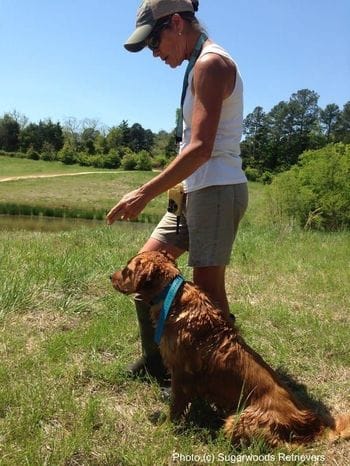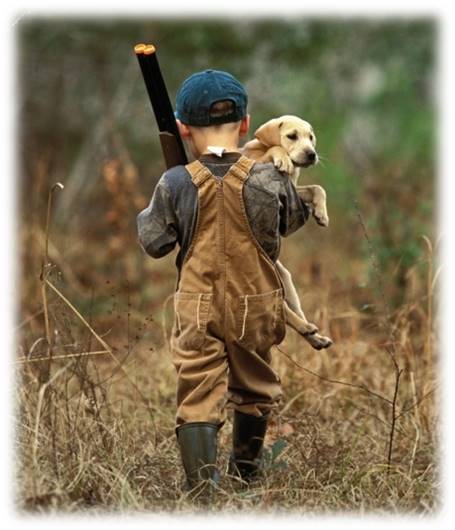Avoidable Puppy-Training Blunders
Congratulations! You've just found the perfect puppy with a dynamic pedigree and all the potential in the world. There are lots of resources that describe how to train a regular dog. But YOU want a retriever who can perform the function he was born for... retrieving game. Here are a few things to avoid with your brand-new puppy if you want to help him succeed in his life and work:
1. Don't chase pup. Playing "chase me" is built in to canine DNA. But you want your retriever to bring birds TO you, not run away with them. From day one, never play the chase game. You can, instead... let pup drag a light line around and, when you call him, reel him in gently, and praise him for "obeying" you. If pup isn't wearing his tether and begins running away... turn the tables and run away from him. When he "catches" you, get a gentle hold on him and praise him for winning the game.
2. Don't leave expensive (or embarassing) inticements lying around. Nothing will make you want to chase your pup more than seeing him carrying around one of a pair of $500 Ferragamo shoes.
3. Don't snatch anything out of pup's mouth. When he brings something to you, make a fuss, pet him, make him feel like a champion, then take the object gently from his mouth. Note! Don't play tug-of-war with a retriever puppy. (Get a Boxer or Malanois or some other breed for that.) Your retriever must not develop hard mouth.
4. Don't overdo it. Foster your dog's passion for his "work". Sending your dog out on a retrieve should be the dog's equivalent of taking a child to Disneyland. Familiarity breeds contempt (and boredom). Don't give pup dozens of retrieves. A small handful twice a day is plenty for a young pup.
5. Don't mix play and "work". A toy might be retrieved, but not all retrieving items are toys. Eventually you'll be getting training bumpers. These are not for chewing and romping. (Unless you want your dog to chew on and romp with your shot birds. For the very young pup, rolled up washcloths or unused paint rollers may be his "training equipment". Don't let them become chew toys.
6. Don't make superfluous "suggestions", thereby teaching pup that your voice is no more than background noise. You're not giving commands to the youngest pup, but you are teaching him vocabulary. Teach him that paying attention to you results in wonderful things (treats and/or getting loving attention.)
1. Don't chase pup. Playing "chase me" is built in to canine DNA. But you want your retriever to bring birds TO you, not run away with them. From day one, never play the chase game. You can, instead... let pup drag a light line around and, when you call him, reel him in gently, and praise him for "obeying" you. If pup isn't wearing his tether and begins running away... turn the tables and run away from him. When he "catches" you, get a gentle hold on him and praise him for winning the game.
2. Don't leave expensive (or embarassing) inticements lying around. Nothing will make you want to chase your pup more than seeing him carrying around one of a pair of $500 Ferragamo shoes.
3. Don't snatch anything out of pup's mouth. When he brings something to you, make a fuss, pet him, make him feel like a champion, then take the object gently from his mouth. Note! Don't play tug-of-war with a retriever puppy. (Get a Boxer or Malanois or some other breed for that.) Your retriever must not develop hard mouth.
4. Don't overdo it. Foster your dog's passion for his "work". Sending your dog out on a retrieve should be the dog's equivalent of taking a child to Disneyland. Familiarity breeds contempt (and boredom). Don't give pup dozens of retrieves. A small handful twice a day is plenty for a young pup.
5. Don't mix play and "work". A toy might be retrieved, but not all retrieving items are toys. Eventually you'll be getting training bumpers. These are not for chewing and romping. (Unless you want your dog to chew on and romp with your shot birds. For the very young pup, rolled up washcloths or unused paint rollers may be his "training equipment". Don't let them become chew toys.
6. Don't make superfluous "suggestions", thereby teaching pup that your voice is no more than background noise. You're not giving commands to the youngest pup, but you are teaching him vocabulary. Teach him that paying attention to you results in wonderful things (treats and/or getting loving attention.)
So how important is rock solid obedience?



